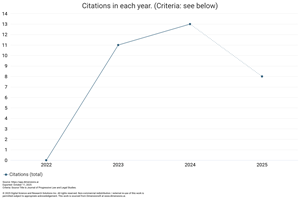Role of Administrative Court to Resolve Administrative Disputes in Indonesia: A Systematic Review
DOI:
https://doi.org/10.59653/jplls.v3i02.1748Keywords:
Administrative Court, Administrative Dispute, State Administrative Decision, Legal Protection, Rule of LawAbstract
This study examines the role of the Administrative Court (Pengadilan Tata Usaha Negara - PTUN) in resolving administrative disputes in Indonesia through a systematic literature review approach. As a crucial pillar within the Indonesian judicial system, PTUN plays a strategic function in maintaining the balance of power between the government and its citizens through independent judicial control mechanisms. This research analyzes the effectiveness of PTUN in providing legal protection for citizens' rights against arbitrary administrative actions and evaluates the implementation of general principles of good governance in administrative judicial practice. The findings indicate that PTUN has significantly contributed to upholding the principles of the rule of law and promoting accountable governance, despite facing several challenges in its implementation. These challenges encompass structural aspects including limitations in human resources and infrastructure, procedural challenges related to the complexity of procedural law, and substantial challenges regarding consistency in legal interpretation and judgment execution. Comparative analysis with international administrative court systems provides valuable insights into best practices that can be adapted within the Indonesian context. This study recommends strengthening institutional capacity through human resource development and infrastructure modernization, simplifying procedural mechanisms, harmonizing legal interpretation, and enhancing public accessibility to administrative judicial services to optimize PTUN's role in strengthening the rule of law in Indonesia.
Downloads
References
Al Amin, A. Y., & Wibowo, A. (2023). Penyelesaian Sengketa di Peradilan Tata Usaha Negara Melaliu Upaya Administratif. Jurnal Penelitian Multidisiplin, 2(1), 128–134. https://doi.org/10.58705/jpm.v2i1.111
Ashwarina, N., Hidayah, H., Azka, F., & Maulid, A. (2024). Pengadilan Tata Usaha Negara. Pemuliaan Keadilan, 1(4), 128–134. https://doi.org/10.62383/pk.v1i4.191
Blegur, S. B. (2022). “Asas-Asas Utama dalam Hukum Acara Peradilan Tata Usaha Negara. Jurnal Hukum Peratun, 5(1), 39–56. https://doi.org/10.25216/peratun.512022.39-56
Candra, M., Ismail, I., & Avriantara, F. (2023). Mengoptimalkan Upaya Administratif Dalam Penyelesaian Sengketa Tata Usaha Negara. SEIKAT: Jurnal Ilmu Sosial, Politik Dan Hukum, 2(4), 401–409. https://doi.org/10.55681/seikat.v2i4.703
Elsye, R., & Muslim. (2020). Modul mata kuliah Hukum Tata Usaha Negara (Cetakan Pertama). Fakultas Manajemen Pemerintahan IPDN.
Herlambang, P. H., Utama, Y. J., & Putrijanti, A. (2023). Upaya Peningkatan dan Penerapan Penggunaan E-Court pada Pengadilan Tata Usaha Negara Semarang. Jurnal Hukum Progresif, 11(2), 157–173. https://doi.org/10.37276/sjh.v2i2.106
Malaka, Z., & Isa, A. (2023). Organisasi Peradilan Tata Usaha Negara Dalam Peradilan di Indonesia. TARUNALAW: Journal of Law and Syariah, 1(01), 22–32. https://doi.org/10.54298/tarunalaw.v1i01.63
Masrufah, & Wibowo, A. (2023). Perihal Putusan dan Upaya Hukum di Pengadilan Tata Usaha Negara. Jurnal Penelitian Multidisiplin, 2(1), 113–118. https://doi.org/10.58705/jpm.v2i1.109
Mujiburohman, D. A. (2022). Hukum Acara Peradilan Tata Usaha Negara (Cetakan Pertama). STPN Press.
Muqsitha, S., & Wibowo, A. (2023). Kompetensi Peradilan Tata Usaha Negara Terhadap Perihal Acara Pembuktian Dalam Sengketa Tata Usaha Negara. Jurnal Penelitian Multidisiplin, 2(1), 10–17. https://doi.org/10.58705/jpm.v2i1.80
Nainggolan, S. C., & Zukriadi, D. (2024). Peran PTUN Dalam Melindungi Hak Hukum Warga Negara Terhadap Tindakan Administrasi Negara. Jurnal Hukum Dan Kewarganegaraan, 5(10). https://doi.org/10.3783/causa.v2i9.2461
Nuna, M., Moonti, R. M., Tumuhulawa, A., & Kodai, D. A. (2020). Kewenangan Penyelesaian Sengketa Tata Usaha Negara Terhadap Putusan Pemberhentian Tidak Dengan Hormat. Univesity of Bengkulu Law Journal, 5(2), 106–118.
Pratama, R. (2023). Asas-Asas Hukum Dalam Hukum Acara Peradilan Tata Usaha Negara. Jurnal Penelitian Multidisiplin, 2(1), 18–21. https://doi.org/10.58705/jpm.v2i1.86
Ramadhani, N. S. (2022). Eksistensi Peradilan Tata Usaha Negara Dalam Penggunaan E-Court Sebagai Upaya Tata Kelola Pemerintah Yang Baik. Jurnal Hukum Lex Generalis, 3(8). https://jhlg.rewangrencang.com/
Saeipul, Adepio, M. F., & Ardhan, M. U. (2024). Peran Peradilan Tata Usaha Negara Dalam Menegakkan Pronsip Kepentingan Umum Dalam Hukum Administrasi di Indonesia. Action Research Literate, 8(5). https://arl.ridwaninstitute.co.id/index.php/arl
Siallagan, H., Siburian, K., & Tampubolon, F. Z. (2019). Hukum Acara Peradilan Tata Usaha Negara (Cetakan Pertama). Lembaga Pemberdayaan Media dan Komunikasi.
Spaltani, B. G., Sulistiyono, A., & Sudarwanto, A. S. (2023). Pelembagaan Upaya Administrasi dalam Rangka Perbaikan Birokrasi dan Pelayanan Publik di Indonesia. Journal of Contemporary Public Administration (JCPA), 3(2), 83–90. https://doi.org/10.22225/jcpa.3.2.2023.83-90
Sutrisno, A. (2024). Analysis of state administrative court procedural law: A recent review and its practical implications. Indonesian Journal of Multidisciplinary Science, 3(8).
Wantu, F. M. (2014). Hukum Acara Peradilan Tata Usaha Negara (Cetakan I). REVIVA CENDEKIA.
Zamzami, A., & Muslim, S. (2023). Pengadilan Tata Usaha Negara Dalam Memberikan Perlindungan Hukum Kepada Masyarakat. Widya Yuridika: Jurnal Hukum, 6(3), 405–414. http://publishing-widyagama.ac.id/ejournal-v2/index.php/yuridika/
Downloads
Published
How to Cite
Issue
Section
License
Copyright (c) 2025 Adi Saputro, Ricky Kurniawan Suriana, Erwin Hutasoit, Sherly Tay, Budi Setiawan

This work is licensed under a Creative Commons Attribution-ShareAlike 4.0 International License.
Authors who publish with this journal agree to the following terms:
- Authors retain copyright and grant the journal right of first publication with the work simultaneously licensed under a Creative Commons Attribution-ShareAlike that allows others to share the work with an acknowledgement of the work's authorship and initial publication in this journal.
- Authors are able to enter into separate, additional contractual arrangements for the non-exclusive distribution of the journal's published version of the work (e.g., post it to an institutional repository or publish it in a book), with an acknowledgement of its initial publication in this journal.
- Authors are permitted and encouraged to post their work online (e.g., in institutional repositories or on their website) prior to and during the submission process, as it can lead to productive exchanges, as well as earlier and greater citation of published work (See The Effect of Open Access).
























